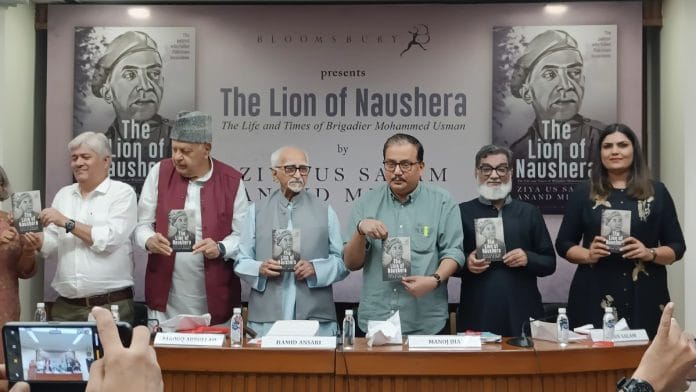New Delhi: Brigadier Mohammad Usman declined an offer from Muhammad Ali Jinnah to join the Pakistani Army and become its chief. Usman chose India at a time when millions of Muslims were choosing Pakistan.
“He had been given the best possible option by Jinnah to shift to Pakistan, and the world will be full of roses. But he opted for India,” said Ziya Us Salam, senior journalist and author of The Lion of Naushera, at the launch of the book at India International Centre (IIC) in Delhi.
Hamid Ansari, former Vice President of India, Farooq Abdullah, former chief minister of Jammu & Kashmir, Manoj Jha, Rajya Sabha MP and Anand Mishra, co-author of the book, were present. Among the audience were political leaders such as KC Tyagi, writers, and journalists.
The book tells the remarkable story of a soldier who stood firm in the earliest days of independent India, defending Kashmir against repeated incursions and earning the nation’s admiration as the Lion of Naushera and being awarded the Mahaveer Chakra.
“His exceptional leadership during the 1948 war unwaveringly committed India as a nation. The ultimate sacrifice offered by him has a revered place in our history,” said Ansari, who has a personal connection with Usman.
Ansari’s grandfather and Usman’s grandfather were brothers, and Ansari’s father was the brother of Usman’s mother.
“These relationships have sustained a living memory,” said Ansari, adding that the book is a timely reminder to the present generation—of the heroism of those who, in a critical moment in our history, successfully defended the integrity of our country.
Ansari quoted historian Ramachandra Guha—a symbol of putative, inclusive secularism needs to be reiterated in these changing times.
‘Usman is our nostalgia’
Author Ziya Us Salam was on a regular morning walk when a publisher called him with an idea—write a book on Usman.
“Destiny chose me to write about him. Before that, I had very limited knowledge about him,” said Salam, adding that the book is actually nothing but a token of respect to the Brigadier, who deserves to be remembered every day.
“If India is one today from Kashmir to Kerala, a lot of credit has to be given to Brigadier Usman,” he said. Salam informed the audience that NCERT is going to add some information about Usman from his book to the school textbooks.
Rajya Sabha MP Manoj Jha said Usman made a choice, stayed in India, and overturned the offer made by Jinnah, the architect of Pakistan. “But today, many Usmans have to prove loyalty 24*7,” said Jha.
“Usman is our nostalgia. He gives that nostalgia which we apparently have lost,” he said.
Also read: Gauri Lankesh’s story reveals India’s anxieties & ruptures, says US journalist Rollo Romig
Changing citizenry
Co-author and senior journalist Anand Mishra said the idea behind the book is to tell people there is still hope.
“I think there will be a reset. There is already a reset happening. Some of the indications we saw in the 2024 Lok Sabha election. Political communalism has not taken such deep root in our society that it cannot be reversed. It’s a timely phase,” he said.
But Jha disagreed. “You guys have a lot of trust in the Election Commission,” he said, adding elections are based on arithmetic, not psychology. “I don’t have any assessment of how long it will take to undo this.”
Farooq Abdullah said India is going through a difficult time. “There is no doubt that Muslims are afraid,” he said.
This is when Jha recalled the hashtag going viral on X after the Pahalgam terror attack: jaati nahi dharm pucha (they asked religion, not caste). The politician said that the terrorists had succeeded in their goal to divide the country.
“If Brigadier Usman was alive, he would have hated it. We did not see this even in taqseem (partition),” said Jha.
(Edited by Ratan Priya)






